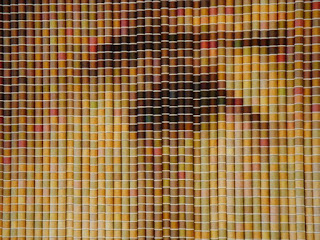 Reviewed by Connie
Reviewed by Connie Published: 2005
It's about: Going to cop out on this one and take a clip of the GoodReads blurb. It takes the entire book for the true plot to unfold, so I don't want to give much away: "As a child, Kathy—now thirty-one years old—lived at Hailsham, a private school in the scenic English countryside where the children were sheltered from the outside world, brought up to believe that they were special and that their well-being was crucial not only for themselves but for the society they would eventually enter. Kathy had long ago put this idyllic past behind her, but when two of her Hailsham friends come back into her life, she stops resisting the pull of memory."
I thought: For my sister's 30th birthday, we went to the North Carolina Museum of Art, where we saw an interesting exhibition. Upon first glance, it was a wall covered in spools of thread. Ordinary sewing thread. As we were in the modern art section, our initial reaction was something like,"Ooooookay that's weird.... but we've seen weirder," and we almost passed by it without another glance.
As we started to walk away, we happened to glance back and this time noticed -- it wasn't just a quirky wall of thread -- it was the Mona Lisa -- upside down. "oooh, cool" we thought, still a little confused as to why it was upside down but more impressed than we had been by the giant thread wall.
And then we spotted it -- in front of the wall of thread, there was a small, glass ball on a pedestal. Skeptical but curious, we approached the glass ball to take a closer look, and we realized that looking into the glass ball reflected the image right-side up in a near-perfect, tiny replication of the real Mona Lisa.
That's the best way I can describe the process of reading this book. For the first third of the book, which covers the three main characters' mostly ordinary, unexciting childhood, I was bored. Disappointed. Annoyed to be let down after so much hype about this book. Honestly, I'm not sure if I would have pushed through to the end if I hadn't been determined to read the book before watching the movie.3/4 of the way through, I had begun enjoying the story, but I was still unimpressed.
By the time I reached the end of the book, it hit me -- it was a masterpiece. A carefully planned, meticulously executed masterpiece. Kazuo Ishiguro, you've done it again. You've taken your ability to manipulate the restrained emotion from Remains of the Day (read my review here) and pulled off something grander than I ever thought you capable.
This oeuvre is anything but indulgent or sentimental, and yet a sense of profound emotion underlies every line, every character, every conversation, and results in an affecting tension that is at once frustrating and seductive. I waited to discover a chink in the emotional armor of this book, waited for Ishiguro to slip up and let one of his characters declare ardent love to another, waited for him to even mildly insinuate his authorial intention or political objective, waited to be able to say, "Aha! I've caught you! You're not as clever as you think you are!" but alas, he wouldn't succumb, he never faltered.
This singular work contemplates so many layers of humanity I don't know where to begin -- from the ethics of cloning to cure disease, to the nature of love, to the nuances of childhood relationships, to the events that make us grow up, to life's inevitable and endless suffering and whether it can and should be alleviated. And it's all so subtle; by the end of the book I found myself pondering philosophical questions without being conscious of what had led me to do so. Ishiguro, you sneaky one, you. After reading two of your books, I've come to the conclusion that you're simply much smarter than the rest of us.
Verdict: Stick this one on the shelf
Reading Recommendations: Trust me when I say this one's worth pushing through to the end.
Warnings: vague references to sex
Favorite excerpts: The "restrained emotion" I mention is perhaps best demonstrated by the final passage of the novel:
The fantasy never got beyond that -- I didn't let it -- and though the tears rolled down my face, I wasn't sobbing or out of control. I just waited a bit, then turned back to the car, to drive off to wherever it was I was supposed to be.What I'm reading next: A Tree Grows in Brooklyn by Betty Smith











